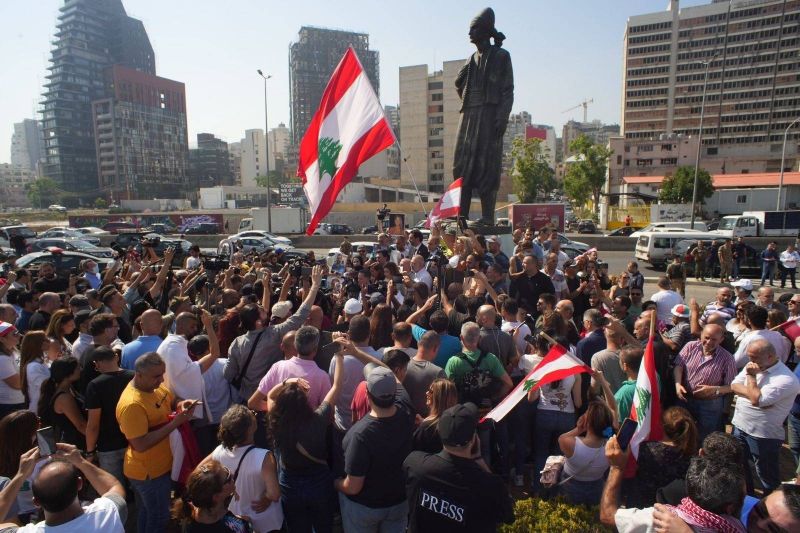
The thirteen deputies associated with the opposition gathered at Nejmeh Square, shortly before the parliamentary session yesterday. (Credit: Mohammad Yassine/OLJ)
After failure, comes the next battles. Hezbollah and its allies won two victories yesterday, albeit with a very slim majority, with the re-election of Nabih Berri as Parliament speaker in the first round of voting and of Elias Bou Saab (FPM/Metn) as deputy speaker in the second round of voting. But despite this first defeat, the opposition group MPs and the traditional parties that claim to be with the opposition are already focused on the next battles: the new cabinet and the election of parliamentary committees.
These committees are the real workshop of the legislature, as all bills and proposals are examined at committee level before being referred to the Parliament for approval.
According to Article 19 of the Rules of Procedure of the Parliament, there are 16 such committees, the most important being Finance and Budget (comprising 17 MPs), Administration and Justice (17 deputies), Public Works (17 deputies) and Defense (17 deputies).
According to the rules of procedure, in particular Article 19, the Parliament forms each committee after the election of the Parliament bureau (the speaker, the deputy speaker, two secretaries and two members) after the legislative elections. The same process is supposed to take place at the beginning of the October parliamentary session (which starts on the first Tuesday after Oct. 15). It is in line with this article that Berri has called the new legislature to its second meeting set for next Tuesday at 11 a.m. to elect the parliamentary committees.
The call was immediately seized upon by the 13 opposition group MPs, MP Paula Yacoubian told L’Orient-Le Jour, who met Tuesday night to “discuss the decisions to be taken in view of the next stage.”
While waiting for the outcome of these contacts, the elected members of opposition groups are trying to put forward the points on which they agree.
“During the election of the Parliament speaker, we voted in favor of justice for the victims of the explosion at the port of Beirut. It is therefore important for us to enter the Administration and Justice Committee, in order to advocate for the adoption of the law on the independence of the judiciary,” said MP Waddah Sadek.
In light of the country’s unprecedented economic crisis, the thawra-linked (revolution-linked) groups also want to reserve their place on the most important committees, including Finance and Budget,” according to Sadek, the new MP for Beirut.
The Lebanese Forces also have specific committees in their sights. “We hope to keep [the chairmanship of] the Administration and Justice Committee,” Ghayath Yazbeck (LF/Batroun), told L’Orient-Le Jour, recalling that both allies and opponents of his party have praised the work of MP Georges Adwan (LF/Chouf) as head of this committee.
“But before embarking on this project, we must work to unify the opponents,” he said. “Especially since [Tuesday’s] session has shown the harm of the divisions of the opposition in the face of the opposing camp, united around a well-known party,” added Yazbeck in a reference to Hezbollah, which managed to reduce political tensions between its allies, including between the Amal Movement and the Free Patriotic Movement to facilitate the reappointment of Nabih Berri and the election of Elias Bou Saab.
The future government
Another deadline looming over the new Parliament is the formation of a new government, just months before the expiry of President Michel Aoun's mandate on Oct. 31.
Lebanon, drowned in the worst economic crisis in its modern history, needs to get a new ministerial team in place as soon as possible to start the reform process, but there is no reason to believe that this will be easy.
The various political forces have already begun to impose their conditions on this plan. This is the case of FPM leader Gebran Bassil, who, on the day after the May 15 elections, was clearly opposed to a government of technocrats, as wanted by the opposition group MPs and several opponents, including the Kataeb.
“The next cabinet should be made up of independent specialists, far from the traditional logic of sharing the cake,” MP Elias Hankach (Kataeb/Metn) said, assuring that his party will not take part in the future team, preferring to remain in the opposition camp.
Opposition groups linked to the Oct.17 revolution have a similar stance.
“The time is not for political quarrels, but for a rescue of the country,” Waddah Sadek said, pleading for the appointment of specialist ministers “capable of taking decisions to get the country out of the crisis.”
Asked about the future prime minister, the MP said that no name has yet been chosen.
“But personally, I am for the appointment of Nawaf Salam (former Lebanese ambassador to the United Nations and judge at the International Court of Justice),” he said.
In Meerab, the position has not changed. LF leader Samir Geagea, who congratulated himself on winning the largest Christian bloc in the elections, is determined to fight for a majority government in order to “enshrine the logic of accountability,” in the words of Ghayath Yazbeck.
This article was originally published in French in L’Orient-Le Jour.